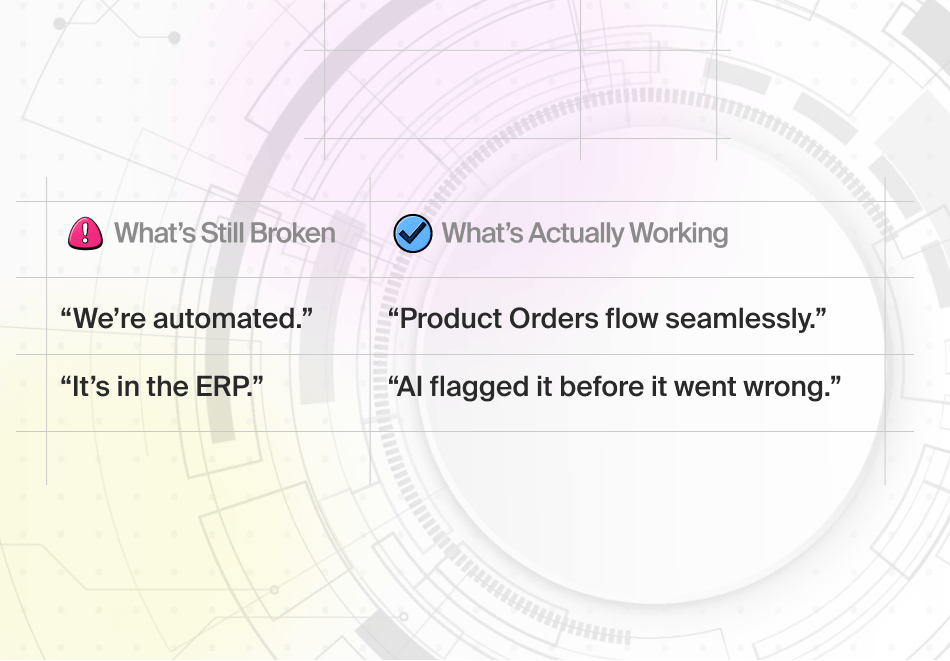Introduction
The ultimate goal of any enterprise is that of speeding up processes, reducing errors, and increasing business output for better revenue generation. With the onset of the digitization era, companies have upgraded their technological prowess to adapt to process automation. It is important to understand that in the rapidly transforming world, process automation is not just a technological ability to speed up processes but a strategic movement towards better use of software to streamline workforce, introduce better work practices and mitigate cost inflations. Since COVID-19, process automation has turned into a need of the hour to improve operations that are built with adherence to process compliance and yield better outputs with a limited workforce. This means process automation will transform enterprises at a larger scale to increase agility and reduce dependency on manual work.
Manual Vs Automation
Is your business still operating through manual handoffs, excel macros, and cumbersome reporting? As businesses are integrating automation in more rapidly in different facets right from HR to Marketing, Production, Sales, and Information Technology; there is a considerable reduction in human intervention for mundane and simpler tasks. A component of efficiency will be introduced with the implementation of Robotics and Artificial Intelligence (AI) in process automation. According to a leadership piece by Sogeti (1), enterprises will look into integrating robotics process automation (RPA) with AI to extract more business value. Read on to know why an enterprise should consider intelligent process automation for complete transformation and the latest trends that will help businesses along the path of said transformation.
Why Embracing the Latest Process Automation Trends and Techniques is a Necessity for an Enterprise?
As an enterprise, you need to ask yourself a key question: Where should the business’ attention be?
While at face-value this question may seem trivial, the entire enterprise architecture revolves around this key aspect. The more attention your skill base gives towards the latest trends like the Internet of Things (IoT), Machine Learning, Cloud, Advanced Analytics, Artificial Intelligence, and automated-integrated workflows, the better streamlined and agile your workforce would be. Hence it is highly significant for enterprises to explore deep into the latest process automation trends and make their employees acquainted with these trends for a competitive edge.
There is no doubt about the fact that legacy systems need upgrades and modernization to encompass latest trends of digitization, modern technologies and to become aligned with the fast-paced, changing business demands. Process automation plays a key role here. If not for process automation, the IT systems would face the brunt of not being able to keep up with business process improvements (carried out usually at a large-scale), leading to lesser productivity and overall loss of revenue. Automation helps you form ‘bundles’ of data and migrate them to platforms for systematic records management. Process automation can help your enterprise reduce the error rate, and increase productivity at a lower cost. But one point to remember is that the process automation described above would only make sense if your company has already transformed into a modern ERP system.
Figure 1 8 Reasons to Automate Your Business Processes

The Up and Coming Trends in Process Automation That Will Transform Your Enterprise
1.Handling the Unstructured Data Challenge: While data on systems has been very much taken care of by current process automation tools, enterprises and their related facets still struggle with unstructured forms of data such as hand-written notes, bills, invoices, images, etc. With the introduction of machine learning and artificial intelligence, businesses are digging up automation solutions that will not only recognize this type of data (with the help of Robotics), but also assimilate and use it in processes similar to structured data.
2.Low-Code Solutions for Faster Results: Robotic process automation when integrated with low code solutions forms a golden bridge of zero human intervention and faster application development. These low code solutions enhance efficiency as well as help in transforming core processes like Customer Relationship Management (CRM) and Enterprise Resource Planning (ERP).
3.Integration of Robotic Process Automation (RPA) with Business Process Automation (BPA): Interdependent workflows have always been a part of large enterprises and the IT skill set in an organization has mostly been at the helm of managing these interconnecting processes in a complex workflow system. The latest automation tools will help in integrating RPA with BPA resulting in the formation of intricate workflows and implementation of all the related processes.
4.Real-Time Automated Decision Making: Enterprises will see more and more management of big data with the help of artificial intelligence and this will facilitate the way for flexible tools for IT operations that will preempt glitches and provide real-time solutions. This will help in better resource-allocation, lesser communication gaps, and fewer outages.
5.A Chance Towards Skill Set Upgrade: When computers were introduced as a tool to reduce human effort, they were met with a lot of apprehensions. In fact, many considered them as machines that would make a human contribution to technology obsolete. Similar apprehension and even cynicism can be seen in the case of process automation tools and software. After all, process automation eliminates the need for human intervention, making many technical jobs outworn.
However, enterprises are now looking up to this advancement in process automation as a chance to upgrade the skill set of their current employee base and make them adept in the latest technologies and tools. This will not only help the IT personnel move from labor-intensive, monotonous jobs to skill-based, dynamic ones, but it will also create a learning curve in the industry resulting in more innovations. When put in perspective, automation is not the cause for losing jobs, it is instead an opportunity for companies to fill the skill set gap and enhance the expertise of their IT personnel for innovation and better strategic output.
By 2023, AI-enabled automation in data management will reduce the need for IT specialists by 20%
The Changing Landscape
An enterprise cannot deny the fact that adapting to the need of the hour with the latest process automation trends is going to work in favor of its core business value. Numerous users across organizations will gain access to data, automated workflows that will be systematically prepared, and actionable insight that will aid towards building an agile enterprise. In the current market being agile as a company will be your strong suit. As they say, the cards are laid on the table; it is up to the businesses now to play their hand wisely!
Remote work is becoming more prevalent post-COVID-19. Companies are looking for more ways to streamline operations, engage the workforce, and yet meet the needs of customers. Process automation plays a major role in volatile market conditions during COVID-19. A combination of Microsoft’s Power Platform, AI – ML, Dynamics 365 for Sales and Dynamics 365 ERP, integrated with Teams allows users to streamline their processes and build needed visibility for management to effectively view the progress of operations remotely.
In fact, a successful use case off-late within various companies is to integrate Dynamics 365 with flow, teams, planner, and SharePoint to enhance compliance of process, coordination with team members remotely, track processes that are running in each department and provide task execution clarity for each employee within a department. More companies are adopting this suite of tools to improve productivity and simplify workforce engagement. All major functions of a company – be it Procurement, Sales, Manufacturing, Quality, Finance or HR, when unified together help a business stay afloat during challenging market conditions and support the over well-being of a business.
Key Takeaways
- Introduction of Automated workflows, Artificial Intelligence, Cloud, Big Data, Machine Learning, and Advanced Electronics has changed the face of process automation for better and faster results.
- Enterprises will need to invest more in advanced process automation tools to stay ahead in the competition and to gain critical business value.
- Evaluate low-cost solutions for process automation that is easily customizable for your business and build enhanced visibility of how your company is performing in a challenging market.
Reach out to us for your company’s Digital transformation








